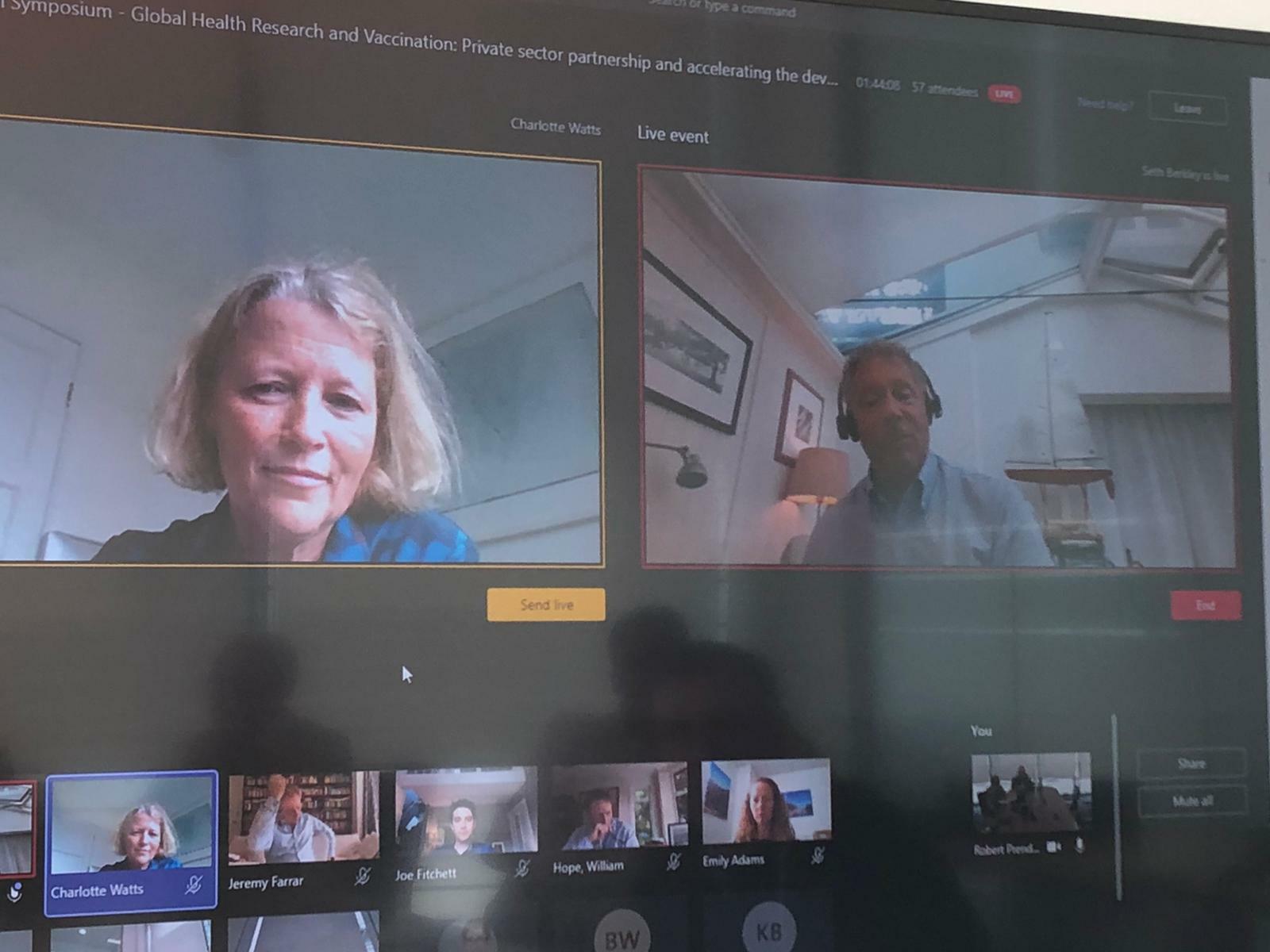
LSTM hosted the last in a series of online symposia that addressed the role of research in vaccine development and delivery and the creation of systems and services to support better health. The symposium brought together a diverse set of speakers from the private sector, public-private partnerships, academia, the UK government and research donors.
The private sectors role in the COVID-19 response
One of the main strands of discussion, as stressed by the Chair of the UK Vaccine Taskforce, Kate Bingham, in her introductory remarks, was the role of the private sector in developing a vaccine that would tackle the COVID-19 pandemic. There is hope that given the international push in this area that one may be available by the middle of 2021. LSTM's Dr Emily Adams and Dr Joe Fitchett explored the successful partnership between LSTM and Mologic which has led to the development of COVID-19 testing technology at lightning speed. Head of GSK Vaccines Global Health, An Vermeersch, explained how the ACT Accelerator for COVID-19 has been an unprecedented example of public-private sector collaboration designed to leverage innovation in vaccine development and hope to ensure future equity in supply.
Private sector diversity – beyond the usual suspects
AFIDEP's CEO, Dr Eliya Zulu, outlined the benefits of partnering with the private sector in vaccine distribution and overcoming ‘vaccine hesitancy’ and myths – such as that HPV vaccination leads to sterility. Influencers and local media can do more to explain the rationale for vaccines and how they work in the body. He suggested that partnerships with pharmacies, informal drug distributers, and private schools may be promising routes to vaccine distribution. Manufacturing should be scaled up and more needs to be done to improve patent and licensing regimes to make medicines and other products more affordable for people in low- and middle-income countries.
The ups and downs of partnership with the private sector
The symposium explored some of the benefits and challenges of partnership with the private sector. Gavi's CEO, Dr Seth Berkley, conceded that the private sector has a chequered history in global health. For example, he noted the damage done when the pharmaceutical sector began legal proceedings against President Nelson Mandela’s government for importing cheaper, generic HIV medications into South Africa.
However, overall he expressed a very hopeful view of the private sector, noting that Gavi (a public-private partnership) has stimulated the creation of new vaccine suppliers, has created a more competitive vaccine market place and has used innovative financing mechanisms like Advanced Market Commitments to stimulate the private sector to work on neglected areas such as the creation of an Ebola vaccination. This positivity was shared by DFID's Chief Scientific Adviser, Professor Charlotte Watts, who praised the ability of the private sector to tackle the problems being faced by low- and middle-income countries. Governments can incentivise the pharmaceutical sector by signalling a large market for tools, medicines and vaccines that they would not otherwise invest in. They both suggested that there were flexibilities within the existing intellectual property regime that could be leveraged to support the health of the poorest and most marginalised.
University of Liverpool's Professor William Hope focused on the benefits and challenges of university partnership with the private sector. He felt that as well as new products these partnerships can increase reputational value and bring in new financing. But there are disincentives as these types of partnerships may not bring academic acclaim and outputs in the form of peer reviewed articles. While they may turn a profit, this is not generally of benefit to individual academics.
An uncertain future
The symposium ended on a cautionary note. The CEO of Wellcome, Sir Jeremy Farrar, explained how the COVID-19 pandemic has ramifications for the economy, education, trust in government, inequities and international relations. The UK has one of the worst COVID-19 death rates in Europe and the decisions that we make today – whether that is to take a globally cooperative or narrowly nationalistic approach – have ramifications for the future. He reflected on the response to HIV. When HIV was first discovered it was suggested that a vaccine would be available within two years. Now, almost 40 years later, we are still waiting. In the light of this the development of therapeutics for COVID-19 is vital as is avoiding a more fractured, fearful and divided world.
Collated questions from the 3rd virtual symposium can be found here
If you missed this third symposium you can watch the recording below.
- A news report and recording of the first symposium 'Global Health Research & Vaccination in the context of emerging pandemics' can be found here
- A news report and recording of the second symposium on 'Global Health Research & Vaccination: access, equity and delivery' can be found here